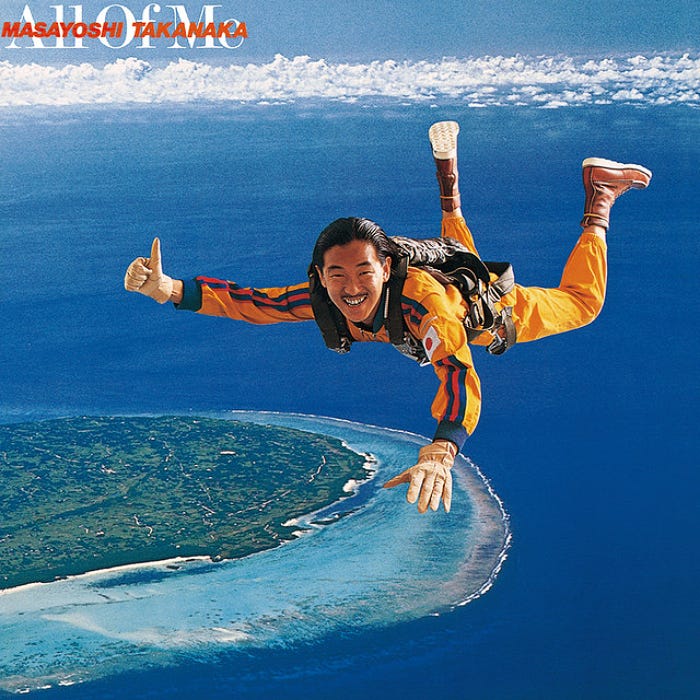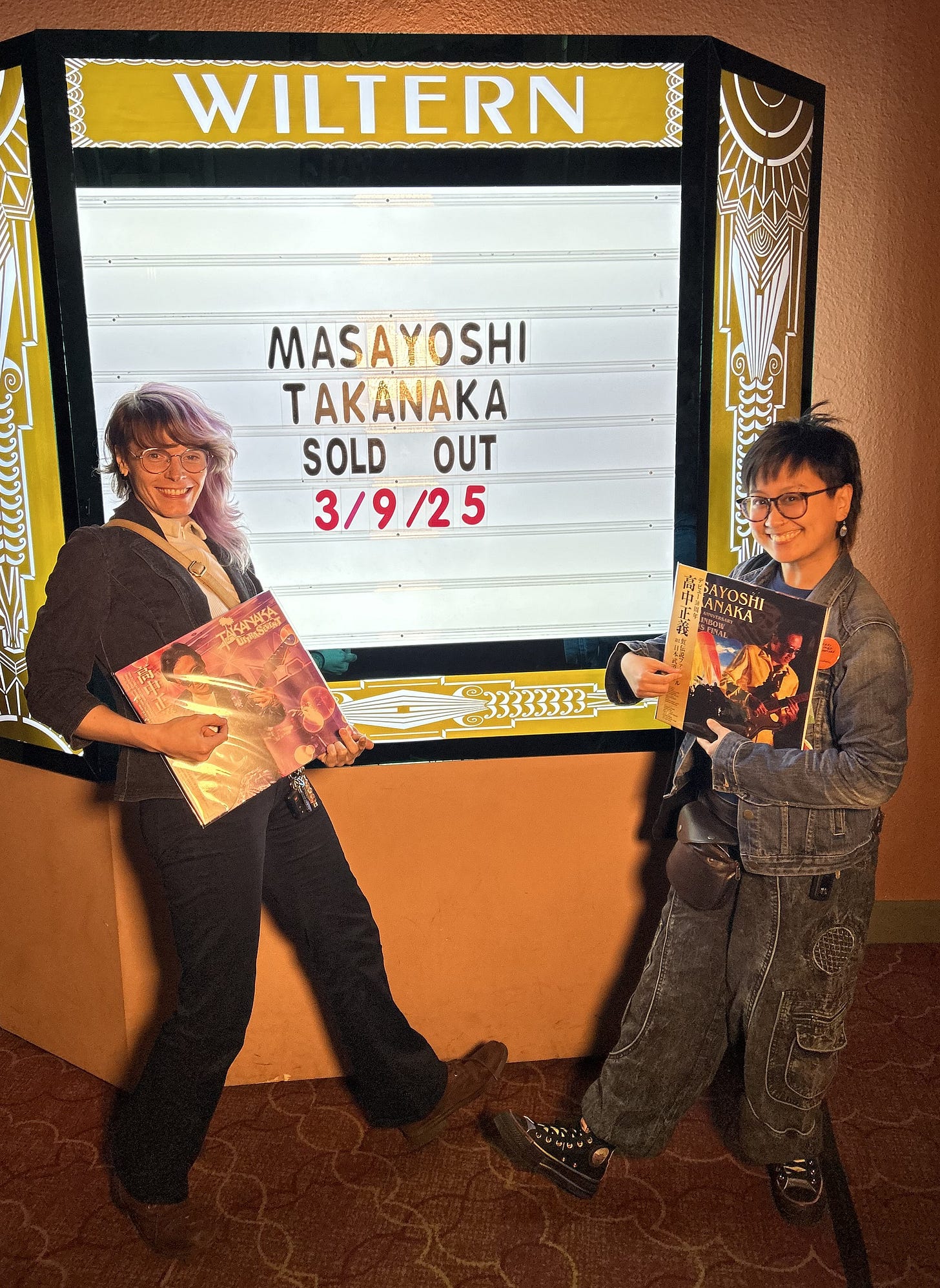Words will never do justice to the reality of being there, that night, in the meatspace. We were explicitly told (multiple times) not to take photographs or record video of the performance— this is a rare instance I find myself thankful for bolder rulebreakers than I. Here’s a brief glimpse into that magical few hours in leiu of any prose I could hobble together. In his own words, here’s Mr. Taka-fuckin’-Naka:
“But— Kay! How can an elder Japanese jazz-rock musician change your life when you’ve never met nor even existed on the same continent together at any point in either of your lives?” you might ask.
“Youtube, lol” I would answer. Surprise-surprise, that’s a fact I had in common with nearly every other 20/30-something in the audience that night. You might expect the crowd to skew older, given the man himself, Masayoshi Takanaka’s prolific career has spanned more than 40 years— that is the case at least when he performs in Japan where crowds are notably older and less raucous. Though we, who held tickets to this legendary and long-awaited night, owed a debt of thanks to the Alrighty Algorithm for serving up Takanaka’s tunes to the collective S.O.S. of the 2020 covid lockdowns.
The line to enter the venue, which stretched around the corner three times to consume an entire city block of downtown Los Angeles, had a stunning visual composition. Hawaiian-print shirts, patched-up denim jackets, and wingtip shoes dotted the excited crowd— one *especially* dedicated friendgroup all donned dandelion-yellow skydiving suits, complete with paper parachutes taped to their backs. To an outsider it would seem amiss, perhaps a dejected shake of the head and a muttered “Darn kids these days…”, but these superfans were paying homage an album cover that easily half the audience owed their indoctrination to. (Yes, describing myself here.) They were met with rabid applause when they literally piled out of a black SUV onto the street adjacent to the mile-wide line; because how could you not?
The album cover for All of Me (1979) features Mr. Takanaka splayed skyward against the deep-blue Sea of Japan. His vibrant yellow jumpsuit and ear-to-ear grin beam the same joyous and carefree melodies that his music does. His confident, casual thumbs-up signals that everything’s going to be fine.
I introduced my roommate/bestie/zucchini to Takanaka’s music shortly after we met and started getting close. They were enchanted the same way I was by his simultaneously energetic and relaxing guitarscapes. When the needle lands on one of his albums, you are hit instantly with a wall of pure vibe— you sink into the nearest couch and suddenly, the dendritic arms of productivity puppet you to life. That paper, that project, that e-mail you were struggling to make headway on is blown back with the force of a pineapple-coconut breeze. To me, these melodies are soothing in the exact style as a tar-black shot of espresso, which is to say just so damn rejuvinating.
These albums (namely, All of Me and Finger Dancin’) occupy unique territory in my brain. I found these tracks at a moment in history where, marred by the plight of pandemic, light was hard to find and dim when seen. I think it’s for exactly that reason that so many of Takanaka’s younger fans express so much enthusiasm, dare I say, passion for his music. For Japanese sallarymen of the 1980’s, Takanaka represents carefree, demure attitudes channeled from a jukebox or radio on a weekend away from the office. For his international Zillenial fans, Takanaka is synonymous with safety, whimsy, and assurance in a digital landscape otherwise rife with news headlines that had only been seen in apocalyptic science fiction tales.
It’s we, us— the theys! Posting with newly acquired wax in front of the photo-op marquee. Note the shadow behind my black pants and how THICCC my thighs appear as a result. The acquired albums— Ultra Seven T and Rainbow Goblins Final are live albums recorded from past concerts.
To this writer, Takanaka is more than a man or musical act. Takanaka is my hakuna matata— it means no worries! And hearing these anthems of assurance in the flesh could come at no better time, because for so many extremely obvious reasons, we have plenty to be worrying about. I have a similar relationship to the internet now that I did during the pandemic, though things are somehow *more* awful when factoring in specific attacks on basic rights and dignities I took for granted back then. I find myself spinning these records and mainlining the dopamine they provide into my craft, because I’m so lack for it in my own body these days.
(I’m sure you feel same…)
If I can inspire you to do anything this week, I hope you’ll give Mr. Takanaka some space on your Spotify playlist tonight and if you do, please let me know! I’m only doing my part as an inspired member of the Takanakult and hoping to spread some much-needed joy. This man devoted his entire career to spreading joy through his music, and I’d like to paraphrase the words he offered us at the end of the night.
Takanaka shared about the experience of creating his album, The Rainbow Goblins, and the inspirations that went into it. Rainbow Goblins tells a desolate and sometimes hopeless story where terrible storms ravage a beautiful world. Eventually, the clouds do break apart and a beautiful rainbow is revealed. He said “I imagine a beautiful rainbow over Los Angeles,” to kick off his final song and transitioning it seamlessly into his Jimi Hendrix-inspired rendition of the American National Anthem.
Takanaka performs his final act of the night on March 9th, a song titled You Can Nevver Come To This Place, followed by the national anthem of the United States.
I can’t imagine that was coincidence, but I can— so vividly— imagine the rainbow he foreshadows. I will channel the memories and energy of this once-in-a-lifetime night for my forseeable future and keep his words close to my heart in the coming months.
I owe my queer joy to this 71-year old Japanese guitarist.






This was a delight to read, and experience through your words! I so have to go look up his entire catalog now! Thank you for sharing your joy!
Love this! I similarly found a band called T-square (and their album Stars and the Moon) via a Japanese boyfriend (not great as partners - wasn't very honest about my queer-ness, then). There was a LOT of pressure back in the day from my family, to be in a hetero relationship, to work in a shop or an office (Uni educated people were snobs, sigh). Of course, me being me, I went and had a relationship with a Japanese guy, a Tongan guy and then went off to Uni when I was 40 :) My parents never knew I was Queer though....to this day, only my son does and my cousin's daughter. One is an ally, the other is Queer too.
I will go and look up this man. I am so excited for you that you got to see him in person :)